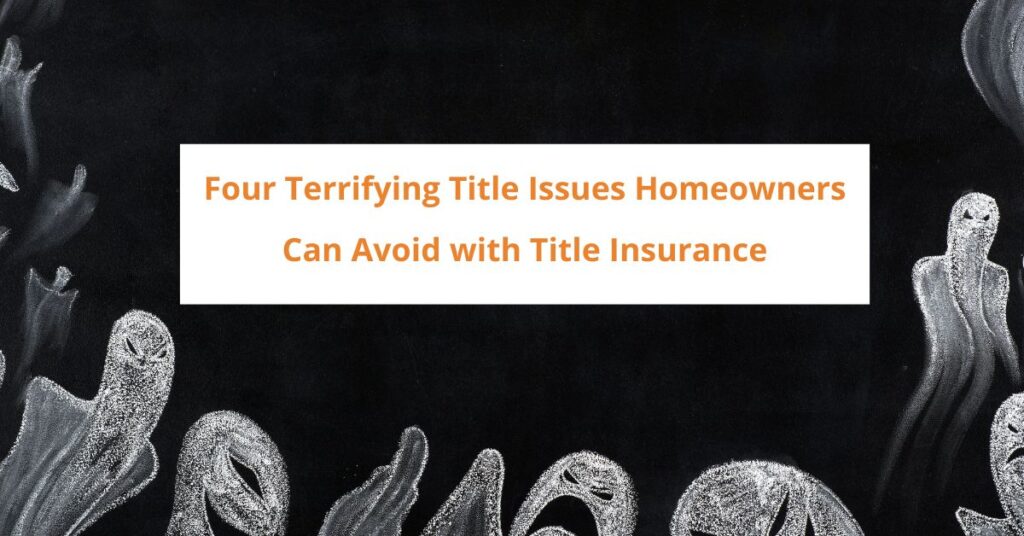
While title
companies don’t deal with supernatural issues, we do see some spooky things on
title from time to time. This blog will explore some of the scariest things
that can happen in a real estate transaction. Remember that the best way to avoid
these problems is with the one-time purchase of Owner’s Title Insurance.
Depending on the insurer, most of these issues can be remedied!
1. Outstanding Liens Against the Property
Some properties have ghosts, and some have something a little easier to detect…unpaid liens. When a property is being sold or refinanced, your title company will run a title search. On that search, your title company may uncover some debts that have gone unpaid that have been recorded by the creditor. Unless these debts are paid, your sale or refinance could be halted as a transfer of “clean title” cannot be executed as the lienholder still owns an interest in your property. If the lien belongs to the current homeowner, they will need to pay the amount due and provide a signed release from the creditor to move forward. If the lien is from a prior owner, then the best course of action is for the current owner to provide a copy of their owner’s title insurance. Should the current owner not have title insurance, they could be held responsible for the lien.
2. Undisclosed Easements or Encroachments on the Home
Next on our list of spooky title issues, we have easement disputes. An easement is a “legal right that allows one person to use another’s property for a specific reason.” They can be placed on a property via a deed, lease, and other documents that need to be drafted and recorded by an attorney. The reasons for an easement differ but usually surround property access, a misunderstanding of property lines, eminent domain (government easement), and protected views. Most title companies have in-house attorneys who can help you navigate this process, which is why it is important to align yourself with a company that has reputable real estate attorneys on staff. Homeowners can investigate these issues through a title search, county plats, or a survey of the property.
An encroachment is a physical intrusion or overlap of the property by an adjacent property and can include man-made and non-man-made structures such as walls, fences, buildings, or trees. While encroachments can be intentional or unintentional, if not addressed, they could result in the encroaching party attempting to take over a portion of land. Encroachments can be risky if the encroaching party attempts to take over the portion of the property affected. While neither easements nor encroachments can technically stop the sale of a home, either could negatively affect the value of the property as it gives a neighbor interest in the property being sold. This can be unattractive to prospective buyers.
3. Fraud, Forgery, Errors and Omissions, and Other Mistakes
Especially during busier times when real estate transactions are at
their height, fraudulent activity is rampant with scammers illegally acquiring
ownership of title and then selling them for a quick profit. Perpetrators go to great lengths to acquire
these properties, often forging signatures and rendering the real estate
transaction between the legitimate buyer and seller invalid. An Owner’s Title
Policy can protect against both nefarious activities such as forgery as well as
honest mistakes such as a missed signature, or a document or lien that doesn’t
show up on a title search due to a misspelled name or incomplete legal
description of the property. Without title insurance, the buyer could be
legally obligated to pay for a missed lien.
4. A Zombie Foreclosure
The fourth and final title issue we will uncover is the “Zombie Foreclosure.” A Zombie Foreclosure is simply when a homeowner vacates their home after receiving a notice of default. This term is used to describe this situation because the property poses a threat to the property values of the neighboring homes as the homeowner has allowed the home to deteriorate. The lender will sometimes not complete the foreclosure to avoid paying for any possible back taxes, repairs, or HOA liens. The title of the home is technically under the homeowner in this situation and the lender is under no obligation to notify the homeowner whether the foreclosure has been completed. This causes an even worse situation… zombie title. This scenario
can be one of the most grueling title issues and unfortunately, there is nothing that can be done to expedite this process other than locating the original homeowner. This can be fast-tracked with the help of a dedicated attorney or title group.
Homeowners
should take this month to ask themselves if they’ve already purchased title
insurance for their home. Most people
purchase this at the time of their purchase, but since it is an optional expense,
some decline to move forward with it. The good news is that title insurance CAN
be purchased after real estate transactions take place. However, if you
wait until after the transaction closes, any issues that arise between the
close of the transaction and the purchase of the title insurance may not be
covered. While title insurance cannot protect you against goons and goblins, it
can protect your property against even scarier things. It’s always best to
purchase insurance before the close of a transaction. Contact your title
company or refer to your closing documents to check if you are covered, and of
course—feel free to reach out to our team in case you would like to hear about
the insurance plans that we offer.
